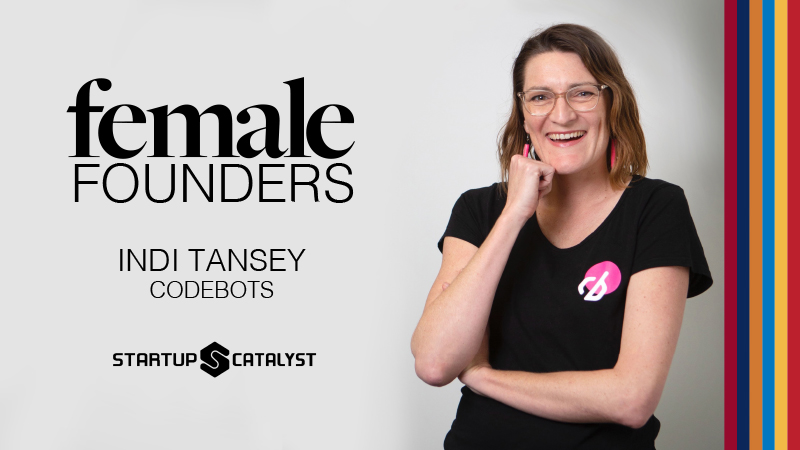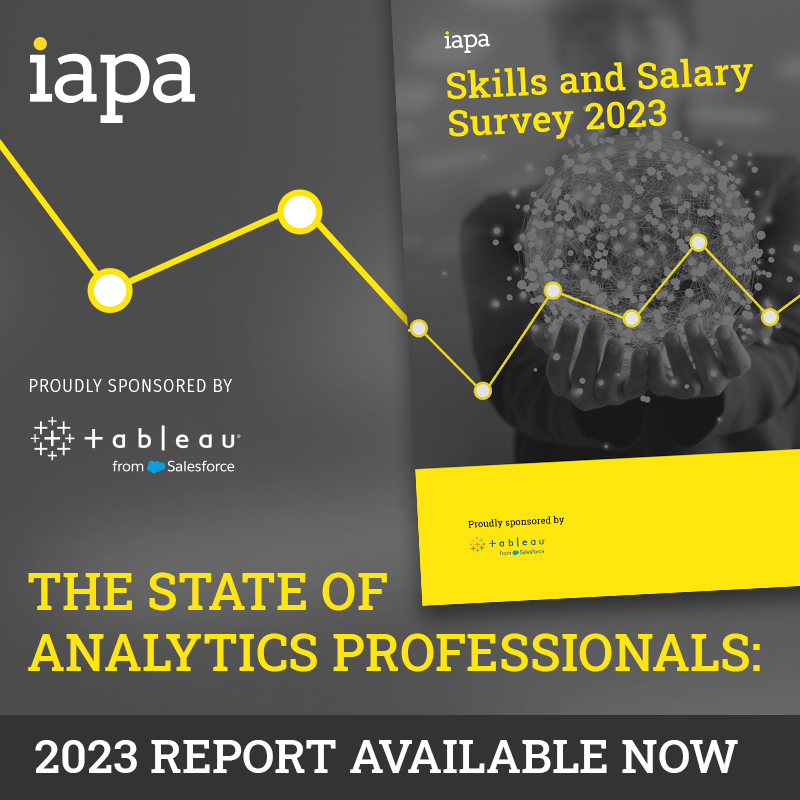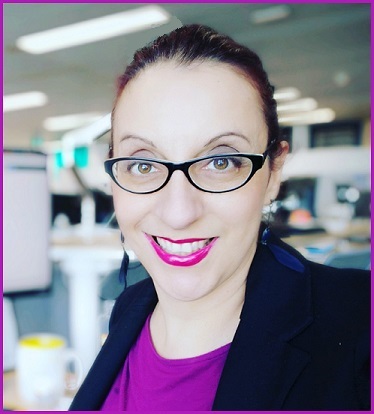Welcome to ‘Female Founders’, the Information Age series profiling 12 women who have grabbed the entrepreneurial reins and ridden into the unpredictability of start-up life.
We talk to the women about their business, entrepreneurship journey and advice they’d give to other women considering starting their own business.
Information Age interviewed all 12 women on the Startup Catalyst Mission to London this year. Startup Catalyst runs regular missions for start-ups, investors, and other leaders to some of the world’s top tech hotspots, such as Silicon Valley, Israel, Hong Kong and London. The goal? To transform both the individual and innovation landscape in Australia.
Today we speak with Indi Tansey, co-founder of Codebots.

Name: Indi Tansey, co-founder
Business: Codebots
Established: 2017 in Brisbane
No. of employees: 60
No. of customers: 40
Information Age: What is your business all about?
Indi: Codebots is a technology platform for building software. Essentially, Codebots are software-writing robots so they can write up to 90% of an application which means that humans get to focus on the fun bits, the creative, and the strategic parts of the solution – and the bots do the heavy lifting.
IA: How did you come up with the idea for your start-up?
Indi: About three years ago now, I met Eban Escott, who's my co-founder. He had just finished a PhD at University of Queensland, looking at how to make software better. He was looking at some really interesting ideas around automation and model-driven engineering. He talked to me about it – he had a terrible pitch. It was an hour long and it was very academic and there was no Codebots at that point. I liked his passion and his vision for what he was trying to do.
He was trying to make software more accessible to people. He felt the way we've been doing it since the 1950s, writing lines and lines of code, seemed redundant like it wasn't a good use of human capital. You don't need to be sitting there writing line after line.
I hear this pitch – I have a history of start-ups and then before that, advertising, marketing, and building communities – and I could see an opportunity. He was looking for someone who would look after the messaging, the people part of the business, then how we were going to get this idea to the world.
We had a vision to build a platform that would be available globally, not just a local service-based business, but something that would scale.
IA: How did you end up on the entrepreneurial path?
Indi: I had a pretty successful advertising career. I was working in Dublin for a big agency. My job had taken me all over the world. I was a copywriter and I just got to work on big brands. I felt like the world was changing. I was like, "We can't just be yelling messages to people in that old-fashioned or traditional way of advertising. I could see the power of communities. If you had a really good idea, you could get people on board and you can do something exceptional.
For me, I stepped out of my life, I thought I'd go and do a bit of traveling, but it turned into a little business. That's when I came up with my travel blog. That was the start of it. It was like stepping away from the normal and it was very successful, and people loved it, and they checked in every day, and people sponsored me to do – it was ridiculous. It gave me the belief that if you had something you believed in really strongly, other people would follow.
I could see this entrepreneurship motto where people had cool ideas about things and they build a community around it, and they tested it, and then it grew from there. As part of my bike trek, I stopped in Argentina. I got quite tired of cycling that many thousands of kilometers and so I lived with three entrepreneurs and I didn't really understand fully what the start-up was at that point. They took me under their wing, and since then, Codebots is my third start-up.
IA: Who is your ideal customer?
Indi: As you can imagine, software is a massive market and while you can do anything with bots, basically the bots just look for patterns. Anything that has a pattern, the bot is capable of creating. Right now, we're targeting enterprise customers specifically with legacy systems that they want to modernise. We work with a mix of government and enterprise customers. We've already launched more than 10 million lines of code, production-ready code for these customers.
We've got some runs on the board. Everything from the Department of Defence, New South Wales Police, Transport and Main Roads – they have these terribly old-fashioned legacy systems that have hundreds of databases and critical information that is just sitting there untapped that they are unable to access and do collaborative things with their teams, or use the data, or to get insights.
IA: What are your international expansion plans?
Indi: We went through the Australian Landing Pad and launched into Singapore in January. We put one of our business developers on the ground there and he's been exploring some opportunities for us. It looks like we've got a channel partner now that we're going to be signing up and they'll be selling Codebots in Singapore.
Then around the same time, we did the same in the UK. We're now about six months into that experiment and we’ve now got two guys on the ground in London.
The next step for us is to get established in these markets and to have some very happy customers to get the feedback about the platform.
IA: What about the journey on Codebots, has there been a time where you just wanted to throw in the towel?
Indi: Yes, we've had some tough times because we've got a big headcount. There's a lot of pressure that comes with that because you're just trying to make sure that the business is going well enough that you've got enough to pay everyone everywhere. It's actually quite a bit of pressure. There's been times when sales have fallen over or investment hasn't come through or there's been a lot of pressure on the team.
I have this incredible founding team, and I think that's part of our secret of success. It's not one person's responsibility to shoulder it all. If someone's having a tough time, they can step aside and go, "Hey, can you look after this for me?"
All of our founding team have kids, and so that's unusual. I just thought of start-ups as being just young single people that are trying to build a sustainable business. I think, in the tough times, there's always been one of us to be strong and stand up and do what needs to be done.
IA: Who has mentored you on this journey?
Indi: My parents are incredible. Now I look back and I think, "Wow", they just always just told me I could do anything and I really believed that. People ask me how I've done what I've done, and they say, "You must be really brave." I'm like, "No, I just think I can do things. I don't put limits on things." [laughs]
My co-founder, Eban, is one of those people who just could see that I had the ability to grow into this role of being the co-founder of a tech start-up – and I'm not technical!
There's a bit of a fear as a woman. It's like, "How can you have a tech start-up if you're not writing the code?" I'm like, "Hang on. Hopefully, we have Codebots and so you don't have to write code." If I have to be technical then this is how I'll be.
I’ve also recently received mentorship from an incredible group, Women In Technology. That's been really helpful to me.
IA: What do you think is the biggest challenge Codebots faces?
Indi: I think there's two. When you're doing something for the first time, you're trying to change people's behavior. People have always done it one way and whether or not we can interrupt that is the question. It feels like we're at a tipping point where people are accepting that automation is coming, the fourth industrial revolution has arrived. The way we're working is changing. Part of that is about getting our messaging right around what we do and what we can offer. Codebots can do so many things, but trying to really hone down that message, that's a challenge for us.
IA: How many people are there at Codebots?
Indi: We have 60 staff already. A big part of my job is making sure we have a pipeline of people coming through to support our business. That's a massive challenge. We're trying to partner with the universities and groups that understand exactly what makes a great culture, what makes people want to be with us. That's a big piece of the puzzle.
IA: How have you funded your business to date?
Indi: Initially, we spun out a service business where we used Codebots technology to build software. If you want something built, you come to us. You don't have to have any knowledge of software – we'll put a developer, a designer, and a testing engineer on your project, and a project manager. We'll build it for you, using the Codebots technologies. That allowed us to build the platform, funded by our service business.
Now that worked to a certain point. That means that you're always have competing forces because you have to keep these customers happy, and if that's not going well, your attention is pulled to that. Recently, just last month, we did a fundraise, a capital raise and we've got some awesome investors from North Queensland who have come on board.
IA: How big was that capital raise?
Indi: $1.4 million.
IA: What will it allow you to do?
Indi: It will allow us to further explore Singapore and UK, really focus on those markets, get people on the ground there and build out those teams. Now that we've got channel partners in those areas, we now need to support them. We're looking at building a support customer success function to the business.
As we meet the right enterprise customers, we build out the blocks to match what they need, and that's adding to our artillery on the platform of what we can sell.
IA: Do you have any plans to raise more capital?
Indi: Hopefully not, but probably yes! [laughs].
To grow, we talked about that challenge of the timing and taking this to market. I think even if we can hit the sales targets that we have, that's only going to allow us to grow at a certain rate. I think it's going to need to ramp up much quicker than that. What we want to do is hit our targets that were set for this first round, deliver on the road map, and all the milestones that we've set.
Then we'll look to raise again. We didn't want to take the giant round now because the danger is there's always that tension between giving up too much of your company when you don't have the solid traction is still just getting a product market fit right. You have to give away more. You have to do a discounted rate because they're taking on more risk. We just have done it in increments.
IA: What advice do you have for women considering the start-up journey?
Indi: I think some advice that I wish I got maybe about 10 years ago would be you don't need to be technical to have a tech start-up. You do have to have a discipline and a scientific way of thinking about things and you have to be systematic and you need to run experiments. But you don't have to be able to write code.
Embrace the things that you are really good at and let them shine and be proud of that because I always felt like I was missing something. Other people would look at you and they'd be like, "You're doing great." I'd be thinking, "Yes, but I'm not a developer." I've had that as a chip on my shoulder and I just wish I’d got rid of it earlier.
If you're a female and you're not technical, but you love big ideas, you want to change the world, you feel like you've got skills and talents that can impact the world, be proud of that, stand up, and don't feel like you're missing anything.
Roulla Yiacoumi travelled on the 2019 Startup Catalyst Mission to London with the Female Founders.










